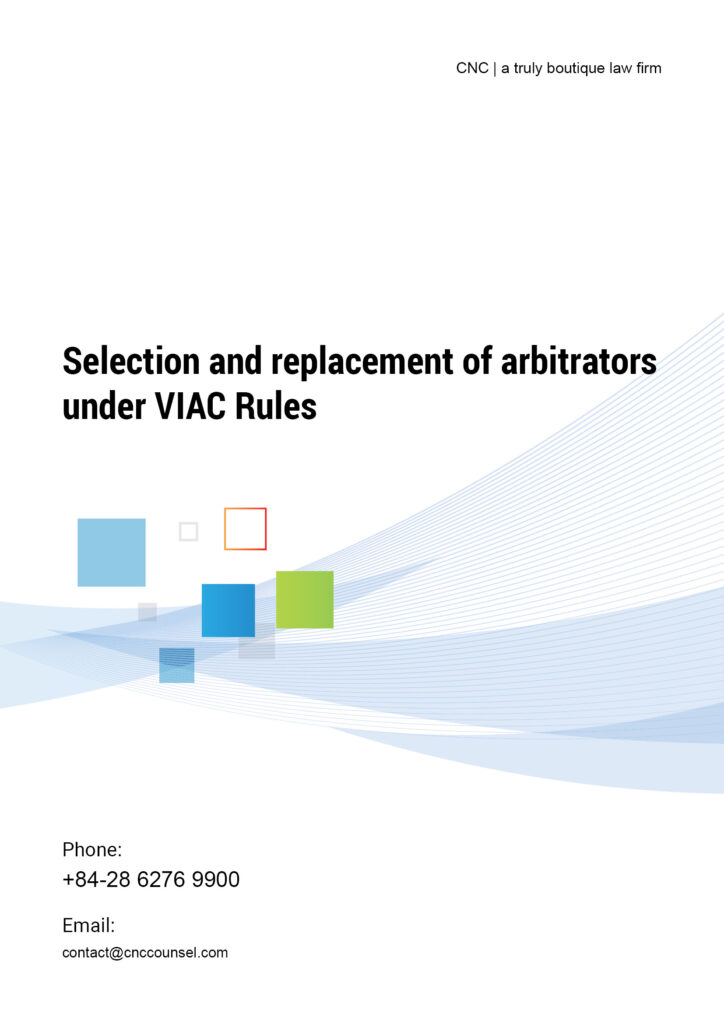Selection and replacement of arbitrators under VIAC Rules
The selection of arbitrator and replacement of arbitrator have always been two matters of great concern for enterprises who have opted for arbitration as a mean of dispute resolution. With the recent records of 475 resolved disputes within 2024 (an 12,03% increase in comparison to 2023)[1], Vietnam International Arbitration Center (VIAC) continued to affirm their role as a credible, reliable and experienced organization to address the above-mentioned matters.
Therefore, following up the article on Dispute Resolution at VIAC, CNC is pleased to introduce the article “Selection and replacement of arbitrators under VIAC Rules”, which aims to inform clients and acquaintances of and to assist them in understanding various aspects of:
- The procedures for the selection/appointment and replacement of arbitrators at VIAC; and
- Notes and experience regarding important matters relevant to the selection/appointment and replacement of Arbitrators.
Due to arbitration’s nature as a dispute resolution mechanism based on agreement, the selection and replacement of Arbitrators play extremely important roles that could directly affect the result of the dispute resolution.
Abbreviation
Parties means Claimant and Respondent;
VIAC Rules means the rules of arbitration of the Vietnam International Arbitration Center;
VIAC means the Vietnam International Arbitration Center.
Reference
The 2017 Rules of arbitration of the Vietnam International Arbitration Center
What is the selection of arbitrator?
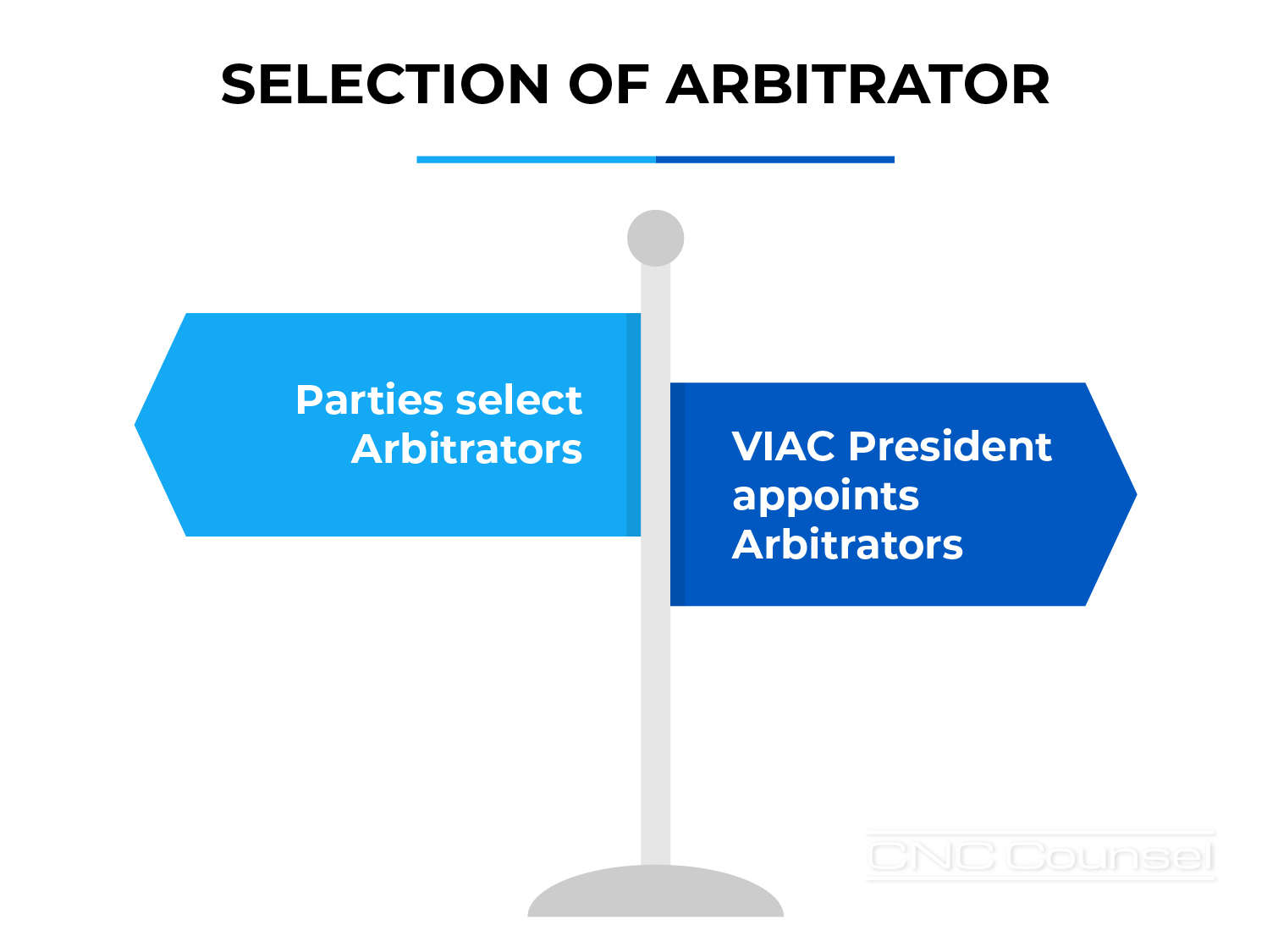
Selection of Arbitrator is an extremely important step in arbitral proceedings, accordingly, the disputing Parties shall select an arbitrator whom they believe is sufficiently qualified to constitute the Arbitral Tribunal, which would directly resolve the disputing issues between the parties. However, it should be noted that there exist two mechanisms in this step, namely, “selection of Arbitrator” and “appointment of Arbitrator”.
The difference between “selection” and “appointment” of Arbitrators
Specifically, selection of Arbitrator means the direct selection of Arbitrator by the Claimant and the Respondent. Meanwhile, the appointment of Arbitrators is a right of the President of VIAC and is only invoked when (i) Parties did not select arbitrator and request VIAC to do so instead or (ii) the Respondent waive their right to select Arbitrator[2].
- Article 7.2, VIAC Rules: the claimant selects a specific arbitrator in the request for arbitration sent to VIAC[3],
- Article 9.1, VIAC Rules: the respondent selects a specific arbitrator during the submission of statement of defense[4].
Process for the Selection or Appointment of Arbitrators
The process for the selection or appointment of Arbitrators at VIAC is spread throughout the VIAC Rules, in general, it serves to ensure (i) transparency, impartiality, and consistency in the constitution of the arbitral tribunal, and (ii) the legitimate rights and benefits of Parties throughout the dispute resolution process.
Accordingly, the Arbitral Tribunal shall consist of 03 members or a sole arbitrator, depending on the agreement of the Parties as specified in the established arbitration agreement.
The process for the selection of Arbitrator by Claimant and Respondent
Where disputing parties agree that the arbitral tribunal shall be comprise of three members, the process for the selection of Arbitrator shall be as follows:
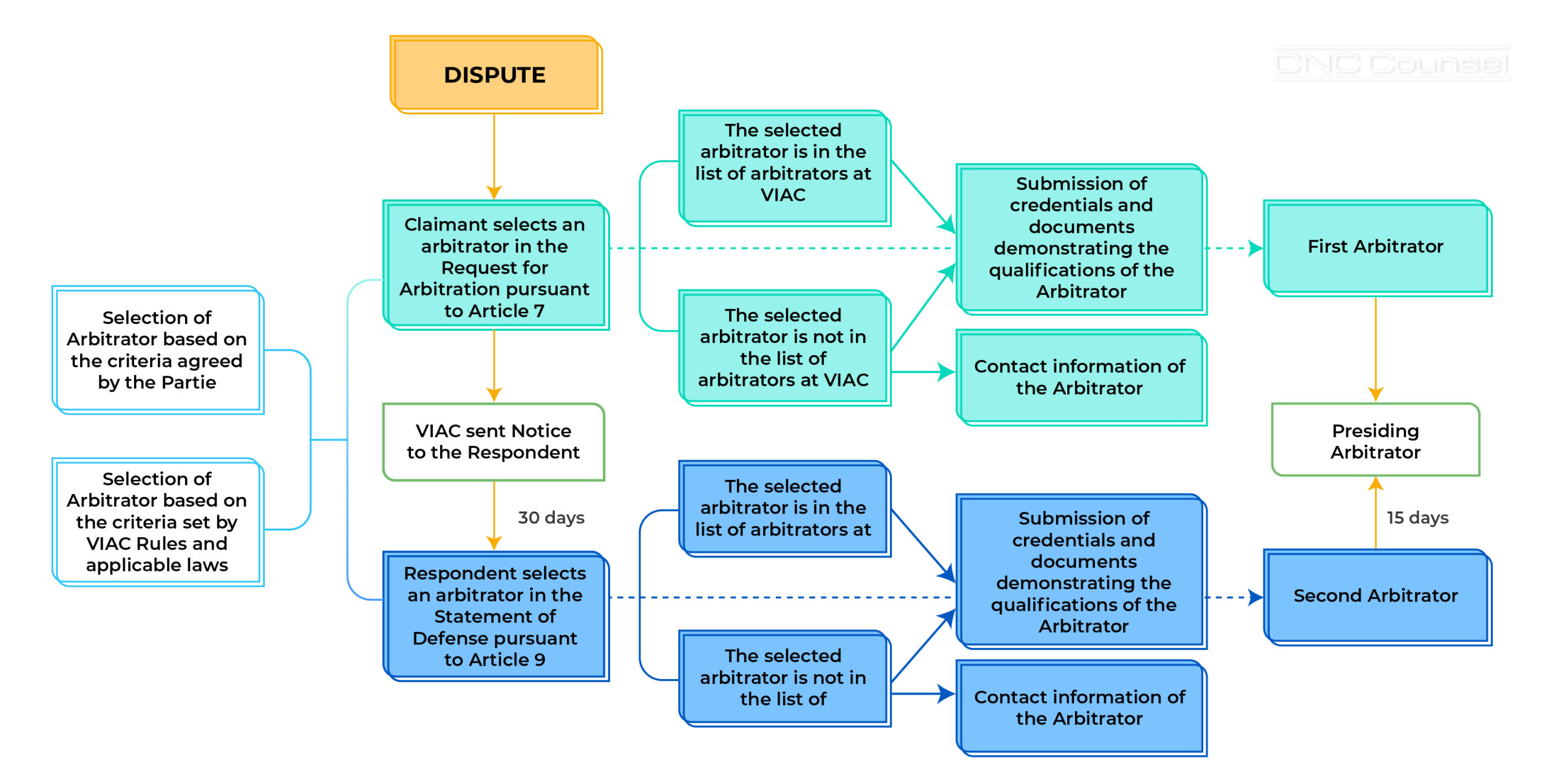
Arbitral Tribunal consists of three Arbitrators
Where the arbitral tribunal consist of a sole arbitrator, the process for the selection is simpler in some aspects, accordingly:
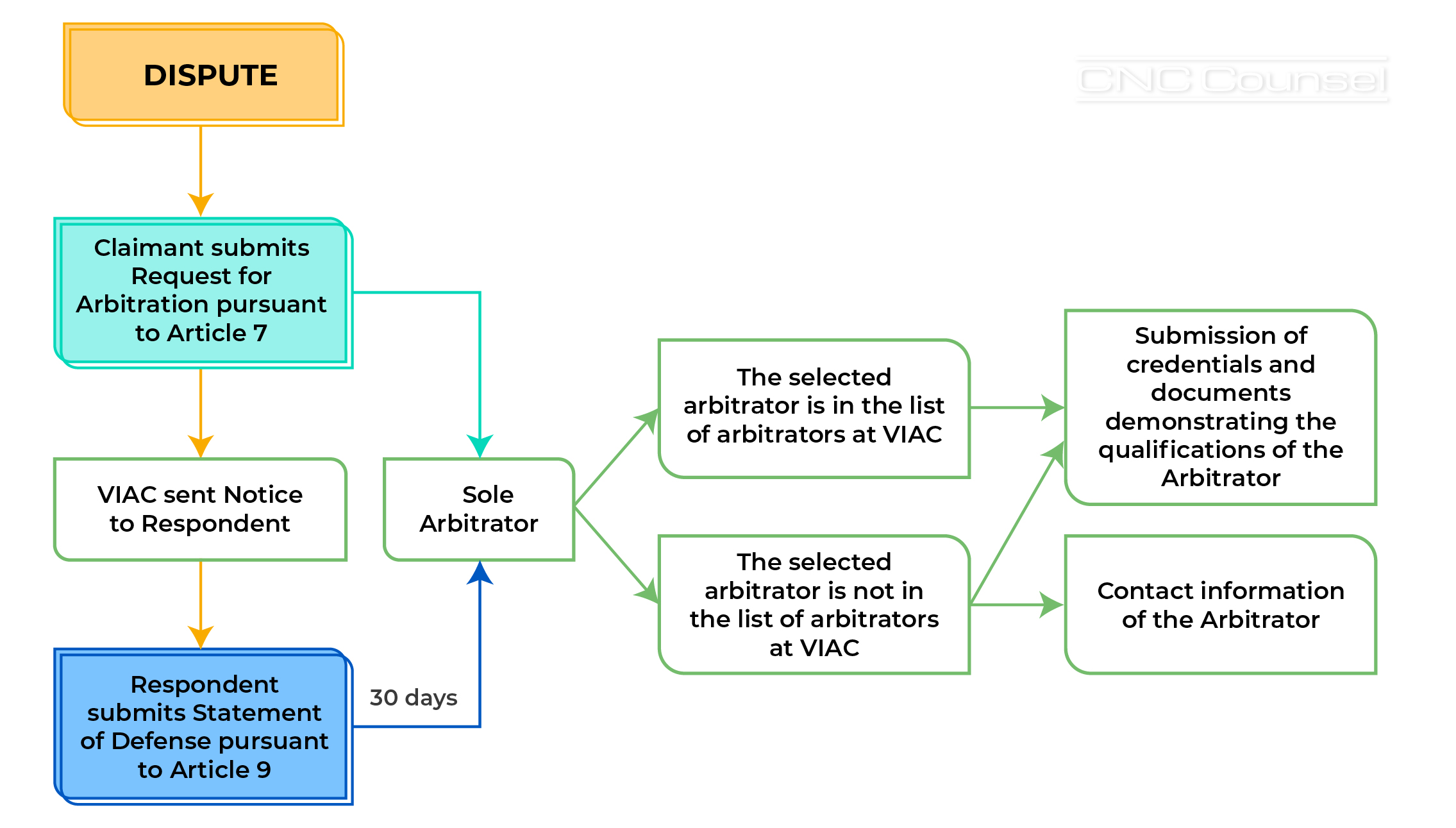
Arbitral Tribunal consists of a sole Arbitrator
For the selection of Arbitrators, Parties could select candidates from or outside the list of arbitrators at VIAC. The selection of candidates from outside the list of arbitrators at VIAC is not an uncommon practice, and in principle, VIAC shall respect the decision of Parties based on principle of Parties’ autonomy in arbitral proceeding. This mechanism is not only considered as the foundation for the freedom in the selection of the entity responsible for dispute resolution, but also reinforces the trust of parties in the impartiality, transparency and effectiveness of the arbitral tribunal during the dispute resolution process.
Concurrently, the selection of arbitrators would also allow Parties to be more proactive in their choice of arbitrators that they considered appropriate to the nature of the dispute, including both the legal aspects as well as the peculiarities of the sector related to the dispute. Furthermore, this mechanism also helps saving time spent on learning about expertise matters from scratch by Arbitrators.
However, as mentioned above, where one of the Parties or the Parties themselves could not make a selection, the Claimant and/or the Respondent are entitled to request VIAC to make the appointment. Alternatively, if the Respondent waive its right to select an arbitrator, the right to select the arbitrator for the constitution of the Arbitral Tribunal shall be assumed by the President of VIAC under VIAC Rules.
Process for the Appointment of Arbitrator by the President of VIAC
Where the Claimant request VIAC to appoint Arbitrator and/or the Respondent waive its right to select arbitrator or request VIAC to appoint arbitrator, the President of VIAC shall proceed with the appointment of Arbitrator pursuant to Articles 12 and 13 of VIAC Rules, the process for which is as follow:
(1) Arbitral Tribunal consists of 3 Arbitrators
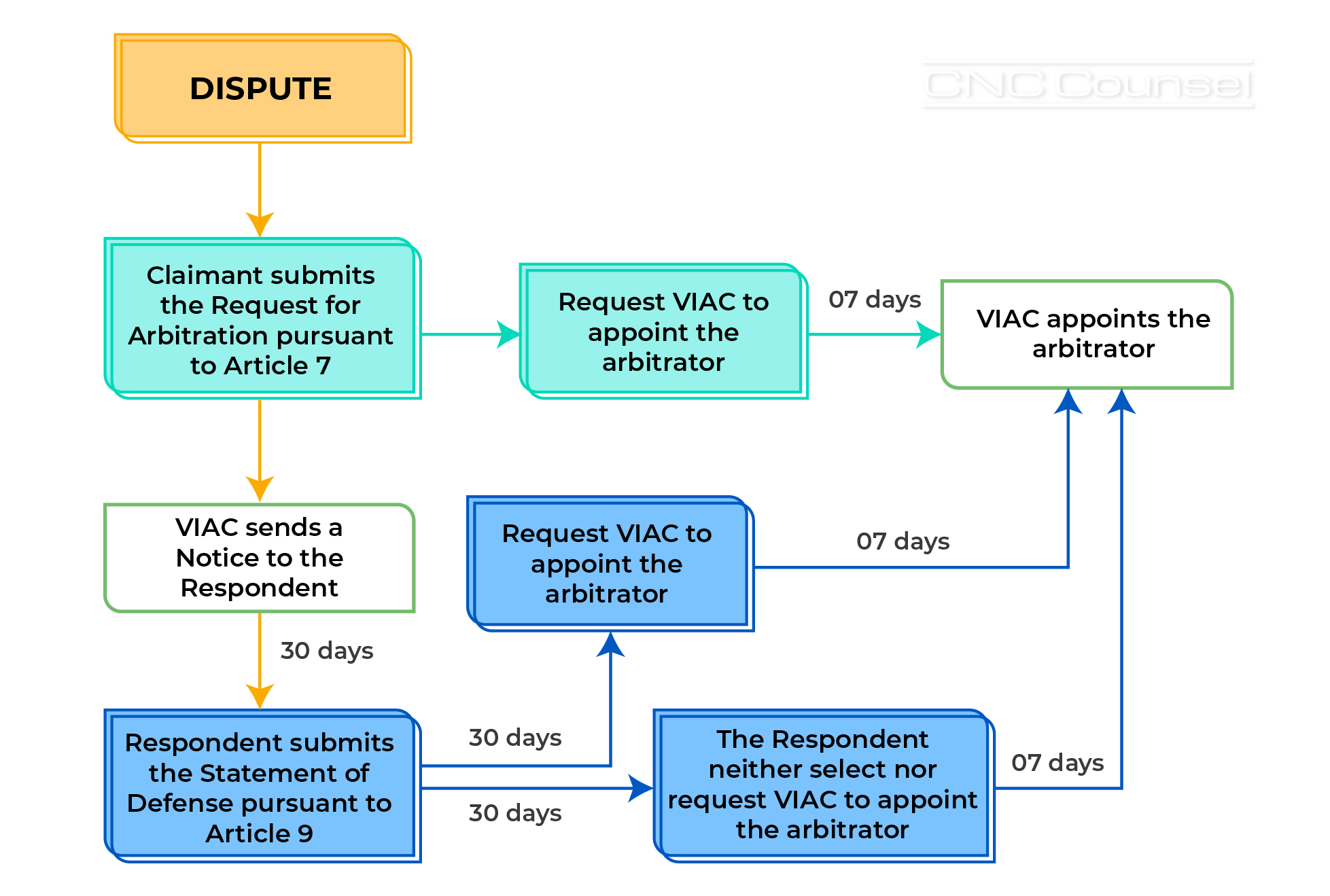
(2) Arbitral Tribunal consists of a sole Arbitrator
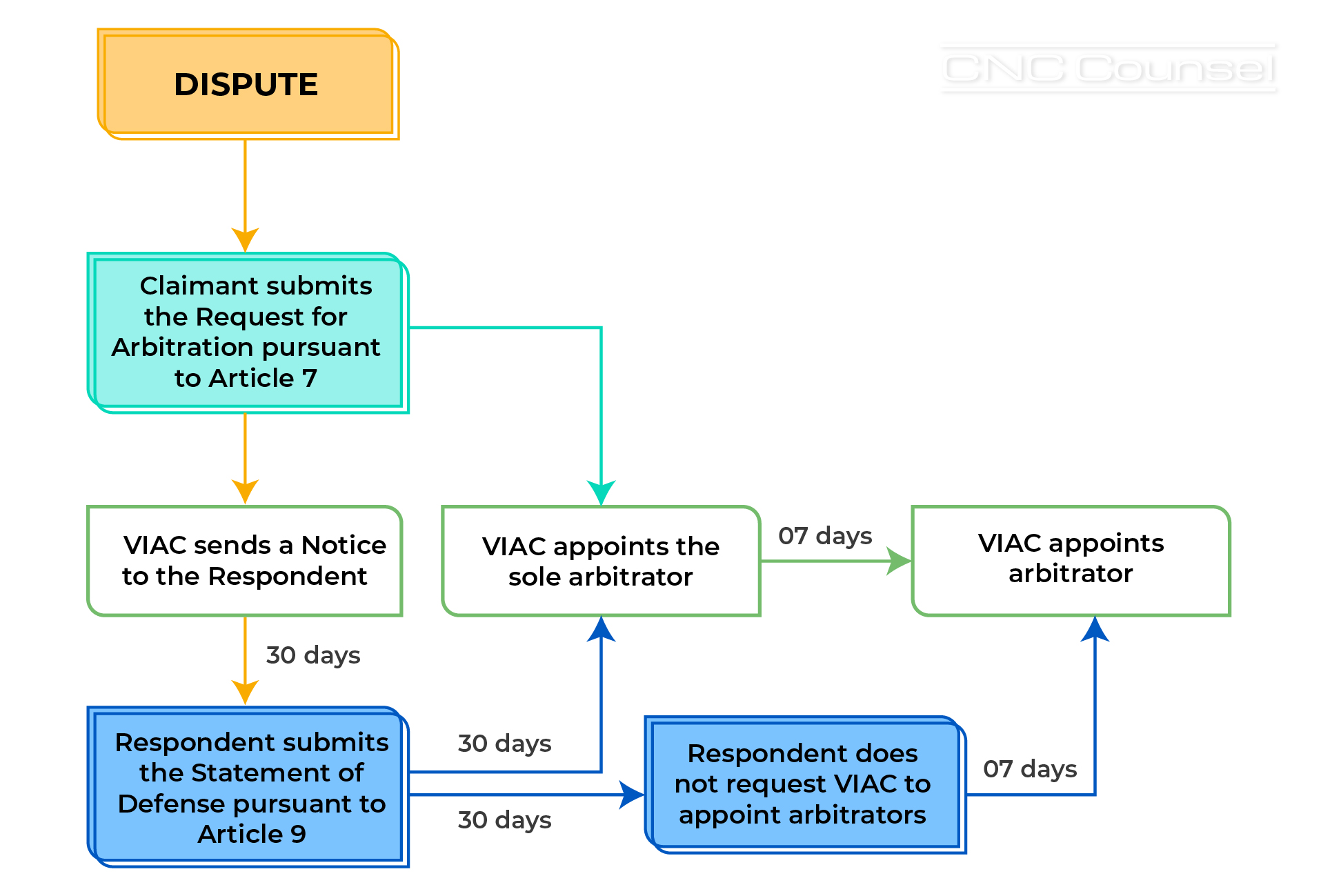
On one hand, the appointment of arbitrator by the President of VIAC aim to assist disputing parties in the selection of the most appropriate candidate when they are not well-acquainted with dispute resolution via arbitration. On the other hand, by empowering VIAC to appoint Arbitrator, the arbitral proceeding could take place without interruption even in the event that the Respondent intentionally fail to select an arbitrator to delay the proceeding.
Information disclosure obligation of Arbitrators
During the selection of Arbitrator, once an Arbitrator receive the notice of selection by the Parties or notice of appointment by VIAC, that Arbitrator shall promptly prepare and send to the Parties and/or VIAC a statement covering elements that could affect that arbitrator’s objectivity, impartiality, and independence (also known as the Disclosure Statement by Arbitrator). Based on the Disclosure Statement by Arbitrator, Parties shall proceed with the review and evaluation of the objectivity, impartiality and independence of Arbitrators.
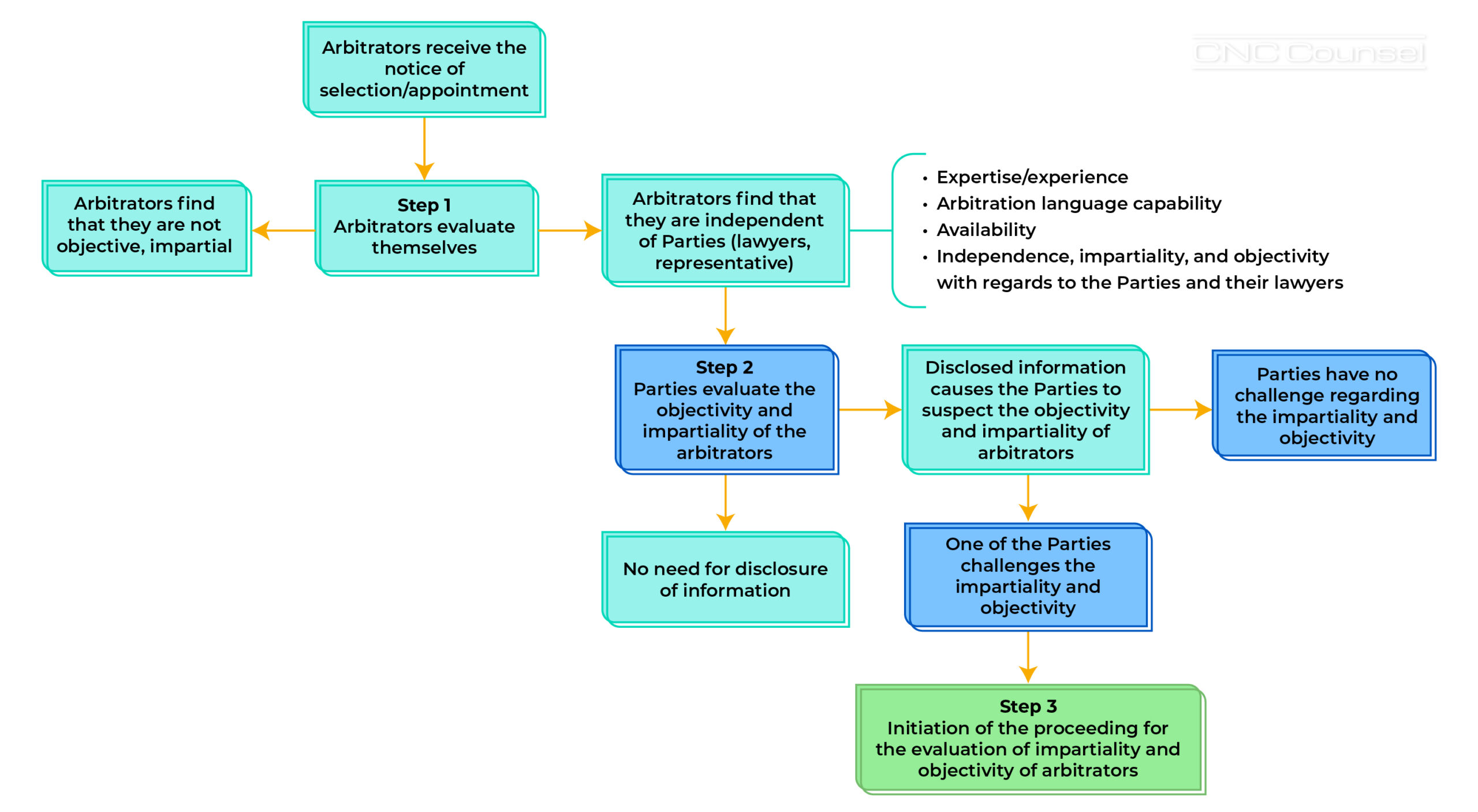
In practice, this obligation is sometimes misunderstood by arbitrators, whether inadvertently or deliberately. To be specific, in Step 2 of the information disclosure obligation, instead of solely providing information that could invoke the suspicion from the Parties and subsequently lead to the review and evaluation by the Parties, some arbitrators opt for the combination of information disclosure and warranty of their impartiality, objectivity, and independence. In other words, during the information disclosure, arbitrators insert their opinions and subjective evaluation on the disclosed information.
This act is contrary to the core purpose of information disclosure obligation, whose sole aim is information provision and does not include the provision of any declaration or subjective opinion of the Arbitrators.
It should be emphasized that, the criteria for the evaluation of an arbitrator’s impartiality, objectivity, and independence are based on the “perspective” of the Parties, not the Arbitrator’s.
Grounds for requests for the setting aside of arbitral award
Additionally, it is observed in practice of dispute resolution via commercial arbitration that the arbitrator/presiding arbitrator might not fully comply with the information disclosure obligation with regard to details that could cast suspicion on that arbitrator’s impartiality, objectivity, and independence.
The breach of information disclosure obligation specified in Article 42.2 of the Law on Commercial Arbitration 2010 could lead to the grave consequence of having the arbitral award subject to setting aside requests.
Notes regarding the selection of Arbitrators under VIAC Rules
In order to provide the Parties and Arbitrators with a specific source of reference, VIAC has documented criteria that Parties need to consider, in addition to the standards set forth in the Law on Commercial Arbitration 2010 and the agreement between the Parties (if any).
Accordingly, Article 16 of VIAC Rules sets out the criteria that an Arbitrator being selected/appointed must comply with in order ensure the objectivity, impartiality, and independence of the dispute resolution process. Non-compliance with these criteria could cause the selection/appointment to be challenged by the other Party, further prolonging the arbitral proceeding.
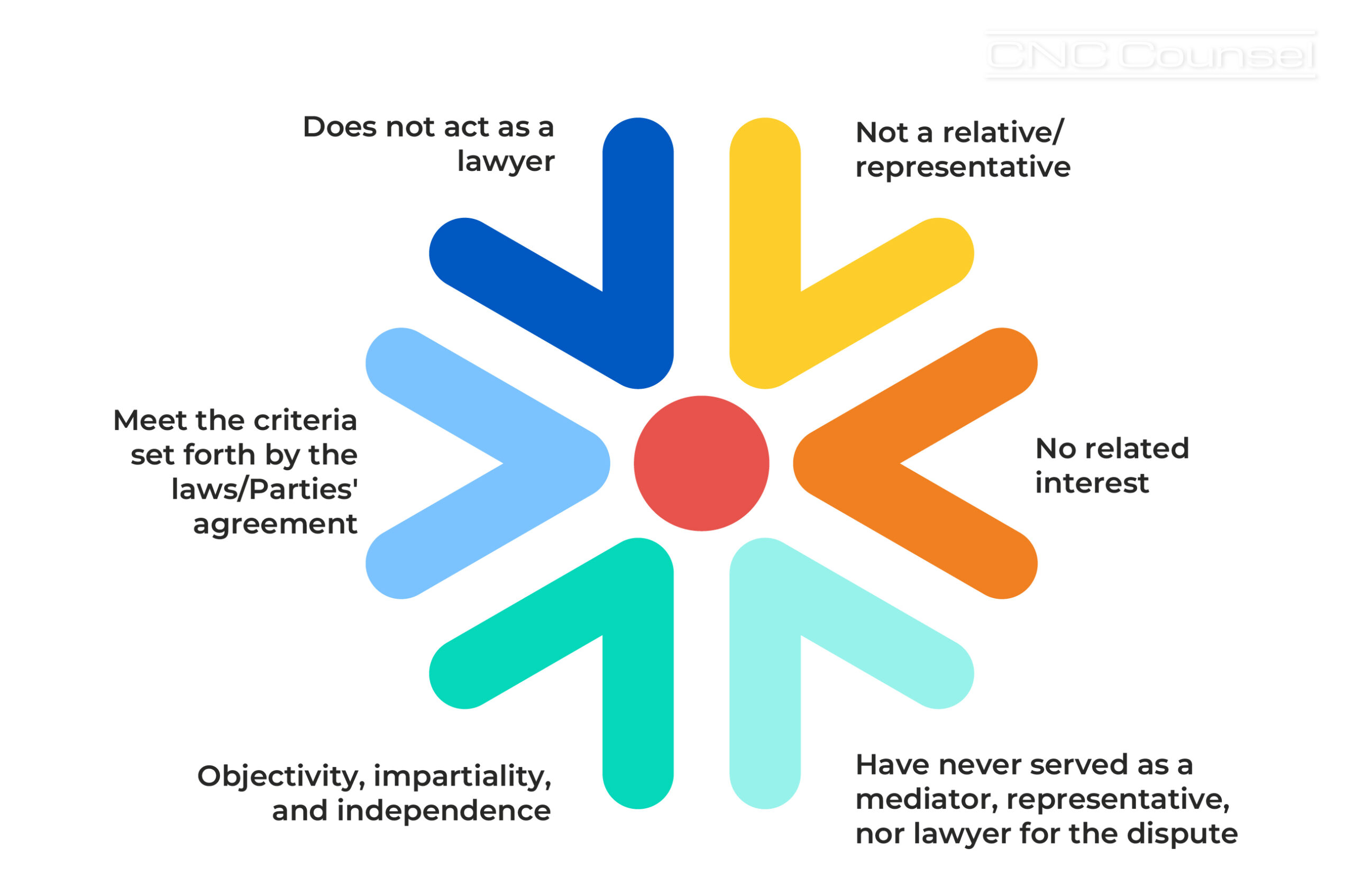
Mandatory criteria for the selection of Arbitrators
Aside from the above mandatory criteria, Parties and the President of VIAC should also consider additional criteria that are drawn from practical experience, which are the following:
- Whether the selected/appointed Arbitrator has experience and expertise appropriate to the sector related to the dispute, as well as the nature and complexity of the dispute.
- Whether the language capability (arbitration language) of the selected/appointed arbitrator ensure the reading-listening comprehension of the case and the presentation of the Parties.
- Whether there exist any potential conflicts of interests between the selected/appointed Arbitrators and Parties, the lawyers of the Parties or the members of the Arbitral Tribunal (if constituted). Whether the selected/appointed Arbitrator has any existing or past relation with the Parties and/or the lawyers of the Parties.
- Whether the place of residence and/or nationality of the Arbitrator (where the dispute involves political elements or the state) overlap with at least of the disputing Parties.
- Whether the Schedule of the Arbitrator appropriate for the effective resolution of the dispute

Additional criteria that could be considered
Aside from the right to select their own Arbitrators, Parties are also empowered to challenge an Arbitrator if they find indications or proof of the selected/appointed Arbitrators’ non-compliance with the criteria established by the Parties or under VIAC Rules.
Replacement of selected/appointed Arbitrators
Disputing Parties could request VIAC to replace selected/appointed Arbitrators to ensure the appropriate and impartial constitution of the arbitral tribunal for the dispute resolution. However, through the observation of the practices of requesting for arbitrator replacement at VIAC, Parties should be aware that, a request for arbitrator replacement is followed by the burden of proof borne by the requesting Party. In other words, once a party has a request, aside from the compliance with the procedures under VIAC Rules, the requesting Party need to provide reasonable grounds for that party’s suspicion of the Arbitrator’s inappropriateness.
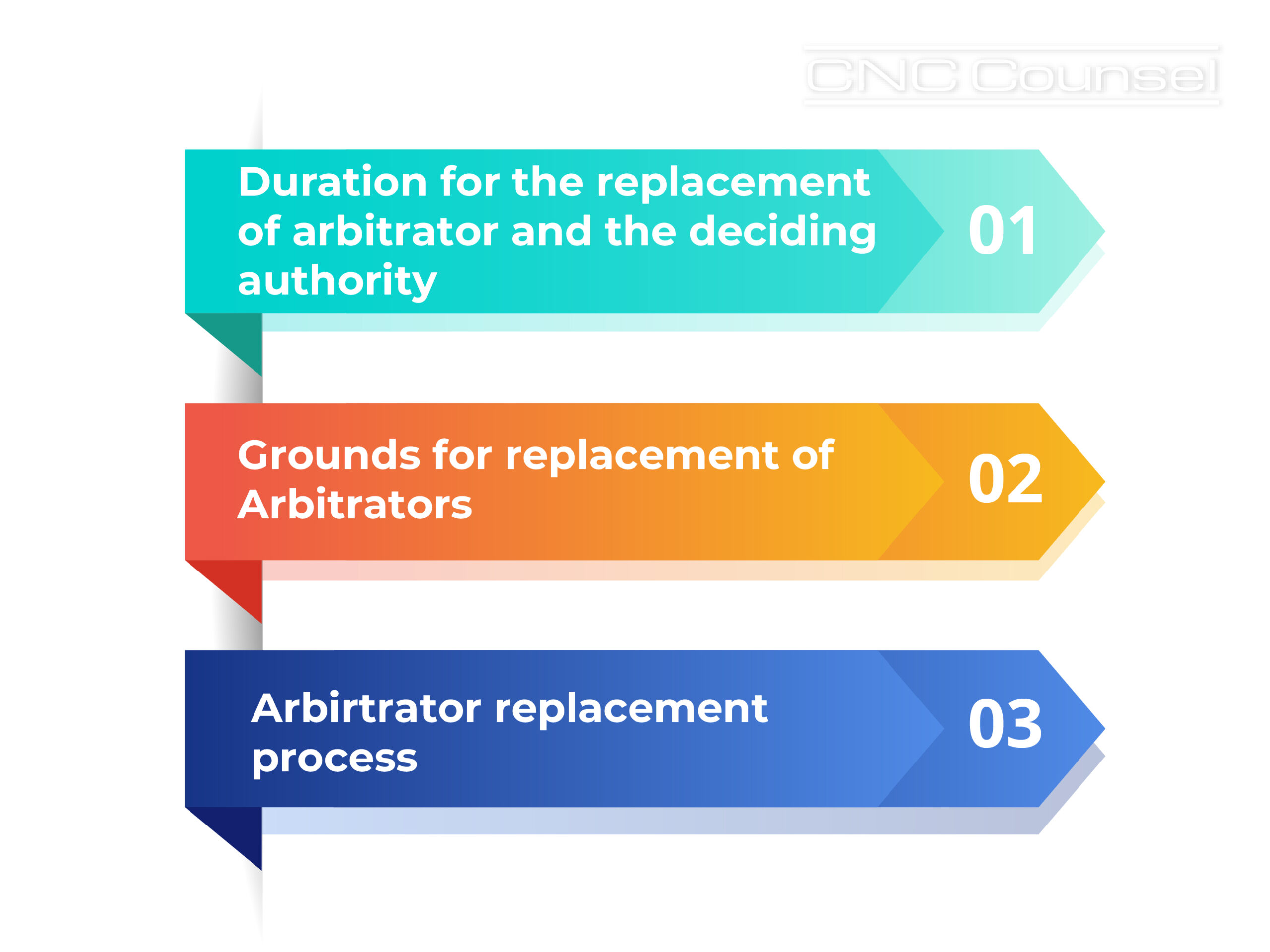
Duration for the replacement of Arbitrator and the deciding authority
Disputing Parties could request for the replacement of Arbitrators at any point of time, whether (i) the Arbitral Tribunal has yet to be constituted or (ii) the Arbitral Tribunal has been constituted. The difference in the time of request could lead to the difference in the deciding authority as well as the process for the issuance of the decision on the request for the replacement of Arbitrators.
Where the Arbitral Tribunal consist of the sole Arbitrator, the request for Arbitrator replacement shall be reviewed and decided by the President of VIAC.
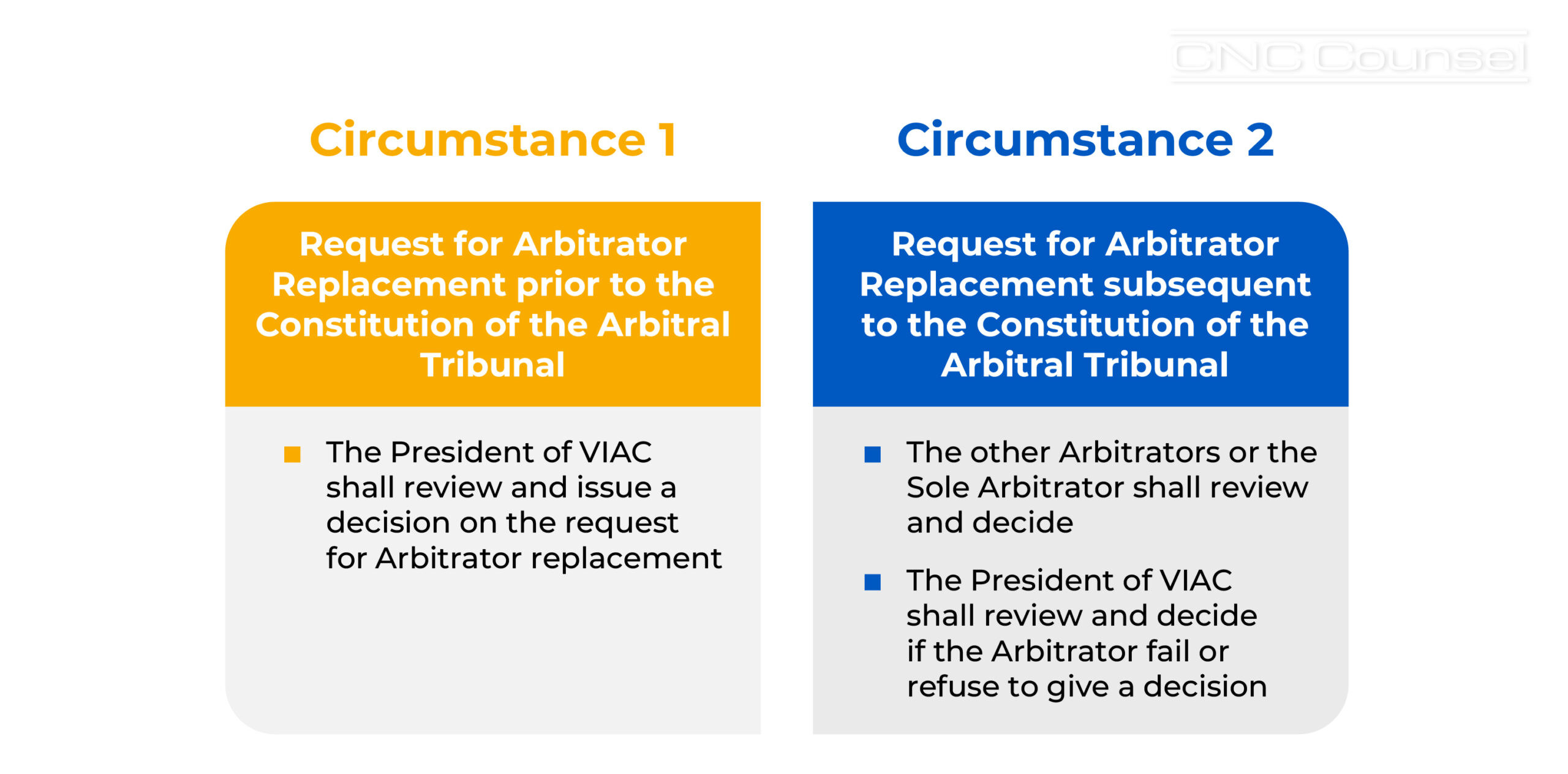
Grounds for Arbitrator replacement
As mentioned throughout the article, selected or appointed arbitrators must satisfy the criteria on the objectivity, impartiality, independence, expertise, and availability requirement, to ensure the dispute resolution to take place in a fair, transparent, and effective manner.
At the time of the notice of selection/appointment, if an Arbitrator find that he/she could not meet the above criteria, that arbitrator must immediately refuse the selection/appointment and therefore, no longer required to disclose information.
If the Arbitrator confirmed that he/she is fully satisfied the standards and criteria for Arbitrator through the Disclosure Statement by Arbitrator, Parties shall proceed to evaluate and decide whether the information provided by the Arbitrator satisfy the impartiality, expertise and availability requirement. If one of the Parties find that there are clear indications of the Arbitrator’s non-compliance with of the above criteria, that Parties is entitled to request VIAC for arbitrator replacement. Naturally, in this case, the burden of proof shall be borne by the requesting Party.
Arbitrator replacement process
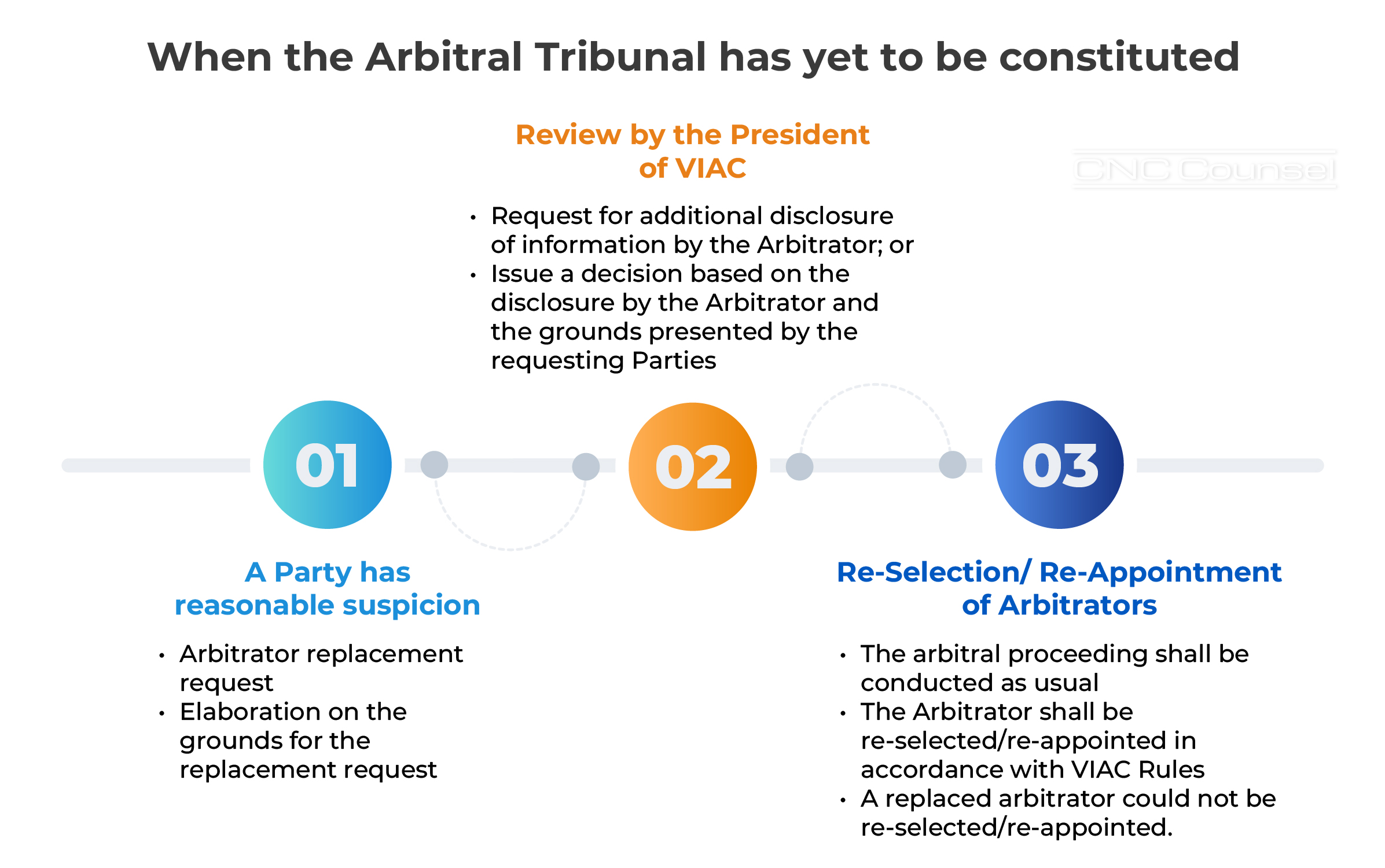
Applicable in the event that one of the Parties request for arbitrator replacement when the Arbitral Tribunal has yet to be constituted (applicable to both Arbitral Tribunal consisting of three Arbitrators and Arbitral Tribunal consisting of the sole Arbitrator)
When the Arbitral Tribunal has been constituted
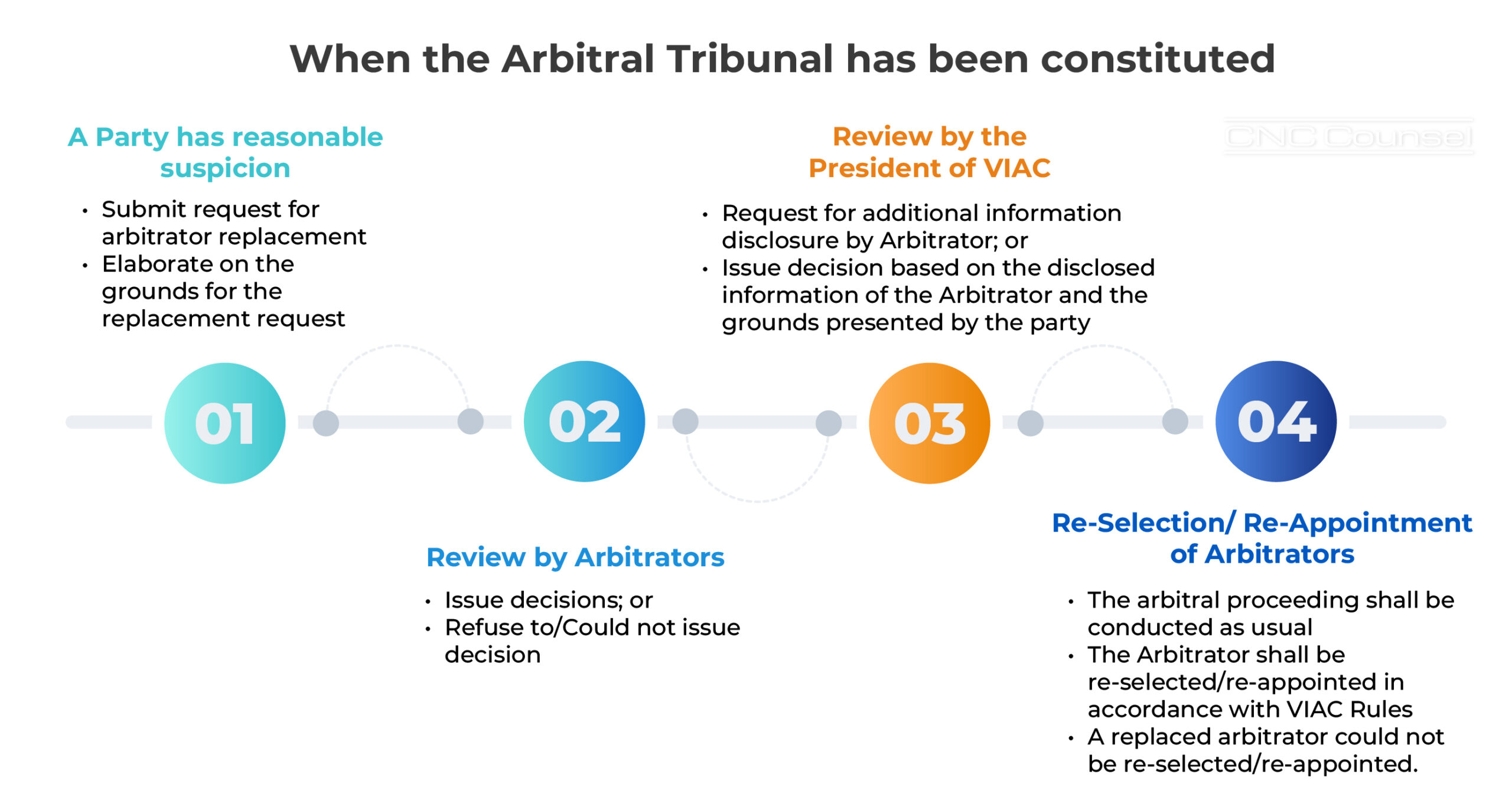
Strategy
In arbitration practice, the selection of Arbitrator is of paramount importance due to its impact on the result of the dispute resolution. However, this matter if often neglected by many, especially the review and evaluation of the arbitrator chosen by the other party to the dispute.
In many cases, we find that enterprises hesitate to challenge or replace the selected or appointed arbitrators since it might leave a “bad impression” on the Arbitral Tribunal. However, it should be noted that, the challenge against or replacement of arbitrators should be implemented when it is deemed necessary for the Claimant and/or the Respondent to not lose their advantages in the initial proceeding stages. Such challenge and/or request could also help to ensure the transparency in arbitration.
Therefore, an appropriate strategy for the proceeding, under the consulting given by experts, lawyers, at the initial stages of the proceeding is well-advised, lest it reach the point of no return.
>> See more: 07 experiences in dispute resolution at VIAC
Contact
For more information, please contact:
CNC Vietnam Law Firm Co., Ltd
Address: The Sun Avenue, 28 Mai Chi Tho, Binh Trung Ward, Ho Chi Minh City, Vietnam
Phone: 028 6276 9900
Hotline: 0916 545 618
Email: contact@cnccounsel.com
Website: cnccounsel
We would be pleased if you visit our office, where you could communicate with the lawyer best-suited for your circumstances. Naturally, if direct contact is not feasible, please contact us through the email address of contact@cnccounsel.com or calll (+84-28) 6276 9900.
Please allow Lawyers at CNC to be of help in the establishment of your solid legal foundation, thereby ensuring the success and sustainable development of your project!
Managed by
 |
Kieu Nu My Hao | Associate
Phone: 036 619 2305 Email: hao.kieu@cnccounsel.com |
 |
Huynh Le Thao Trang | Junior Associate
Phone: 028 6276 9900 Email: trang.huynh@cnccounsel.com |
Disclaimers:
This article is prepared or used solely for the purposes of introducing or updating clients of the issues and/or the developments of legal perspectives in Vietnam. The information contained in this article shall not constitute an advice of any kind and could be changed without advance notice.
[1] Annual Report of 2024, Vietnam International Arbitration Center.
[2] Articles 12 and 13, VIAC Rules
[3] Article 7.2.(e), VIAC Rules
[4] Article 9.1.(d), VIAC Rules



